
As we move into 2025, the pace of change in search marketing shows no signs of slowing down. With new challenges and opportunities on the horizon, staying ahead has never been more crucial.
The On-Page & Content Summit brought together some of the sharpest minds in SEO and content marketing to tackle the biggest challenges facing our industry right now.
From AI-driven content challenges to audience-first SEO, speakers got straight to the point – what’s working, what’s not, and what businesses need to change to see real results in 2025.
If you weren’t there, you missed a lot – but don’t worry. We’ve pulled together the biggest takeaways from the event, giving you the insights and actionable tips to apply to your business.
The New Era of Search: Why Topical Authority Matters More Than Ever [Dani Leitner, SEO Consultant at danileitner.ch]
First up was Dani Leitner, whose session told us all about how topical authority is the future of search. Dani highlighted how Google’s ranking signals have shifted away from domain authority to prioritise websites that demonstrate deep expertise in a focused subject.
Drawing from her own experience, she explained how her travel blog unintentionally became an authority on interrailing, securing first-page rankings and driving almost 90% of its traffic.
But Dani wanted to find out how to achieve topical authority intentionally, not just stumble onto it as she did with her blog. So, she started researching.
Dani walked through Google’s evolution from RankBrain in 2015 to E-E-A-T (Expertise, Experience, Authority, Trust) and the 2024 crackdown on site reputation abuse.
The message was clear: businesses wanting to rank need to align all their content with a single, well-defined topic. Sites attempting to rank for unrelated content – like HubSpot did with third-party articles – risk losing traffic fast.
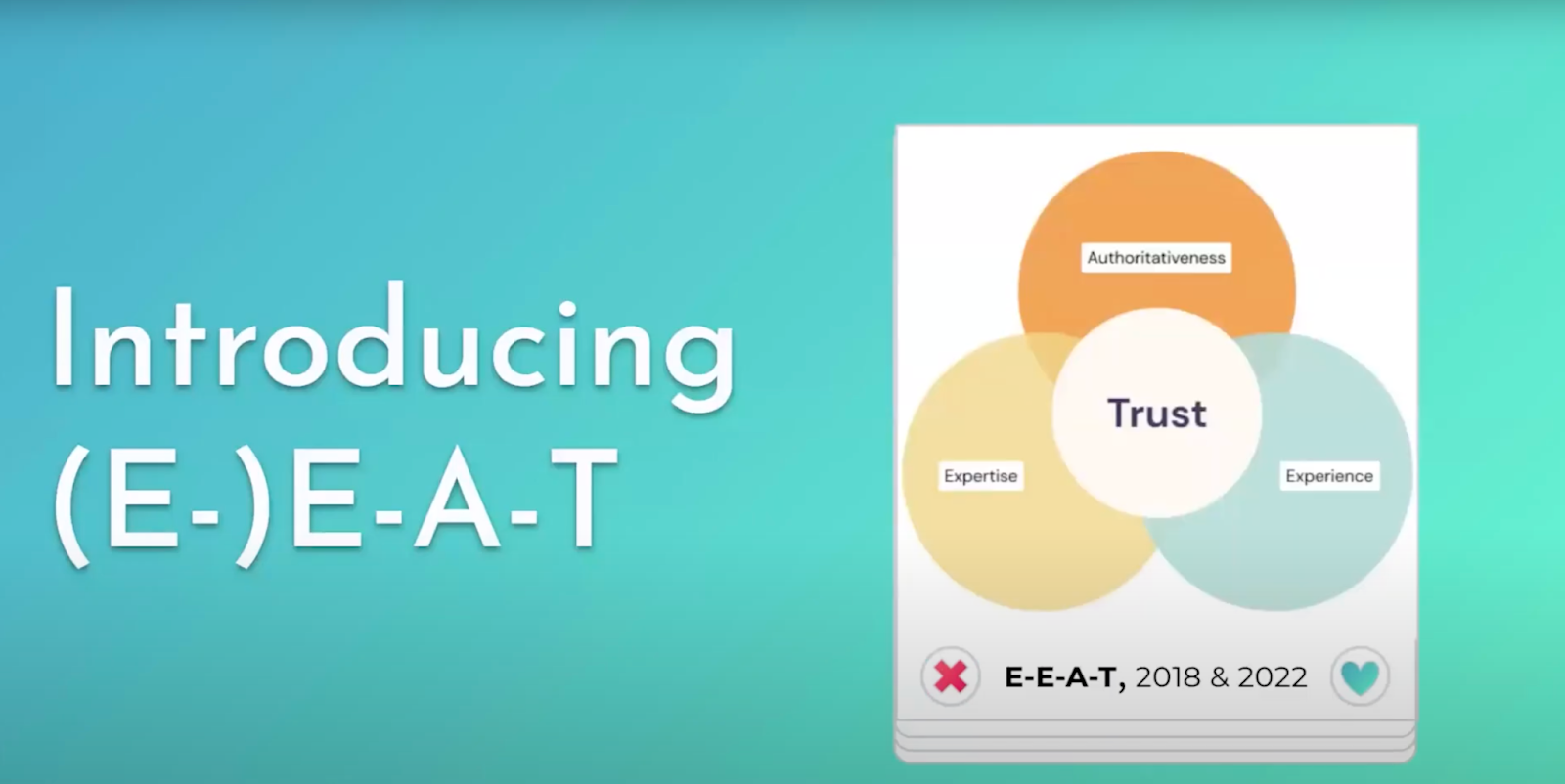
To establish topical authority, brands must:
- Choose a primary topic and commit to it → Even if a business has multiple products, it should focus on its core niche for SEO. In e-commerce? Find out how to create an e-commerce blog strategy with impact with our comprehensive guide.
- Prioritise in-depth, high-quality content → Answering specific user questions and providing valuable insights positions a brand as an expert.
- Go beyond traditional SEO → Engaging on podcasts, social media, and other platforms strengthens a brand’s authority in Google’s eyes.
- Track performance and refine strategy → Keyword tracking and iterative improvements are essential to maintaining search visibility.
Dani’s takeaway? Domain authority is dead – long live topical authority. Brands that focus, specialise, and prove their expertise will win in search.
AI Overload: How to Optimise Content & Stand Out in an AI-Flooded Web [Andy Chadwick, Co-founder and SEO Strategy Lead at Snippet Digital]
AI-generated content is flooding the web, but Andy Chadwick made one thing clear: completely AI-written content is doomed to fail.
AI produces ‘average’ content based on probabilities. It lacks originality, emotion, and an understanding of your customers. This content doesn’t convert, and businesses relying on AI alone will struggle to stand out.
That doesn’t mean AI isn’t helpful – it’s just about using it strategically. Andy shared how he speeds up writing by using AI for:
- Smoother transitions – Improving flow between sections.
- Generating counterpoints – AI can suggest opposing views to strengthen arguments.
- Tone adjustments – Refining formality, humour, and clarity.
- Summarising complex ideas – Making expert content more accessible.
- Formatting lists and structures – Turning information into easy-to-digest steps.
But what about AI overviews ‘stealing’ clicks? Andy broke down how this varies by niche. Google avoids AI overviews in high-risk areas like politics, finance, and health – meaning these industries can still rely on long-form content for visibility.
If you work in the travel industry, set yourself up for success by reading more information on SEO for travel websites.
For other sectors, appearing in AI summaries is about building citations, authority, and topical relevance – all factors businesses can optimise for.
This is great…but what should brands and SEOs do in response?
- Double down on credibility → The best way to rank in AI overviews is to become a cited source.
- Prioritise content that avoids AI overviews → Where AI doesn’t summarise, CTRs are actually increasing.
- Optimise for 3D search intent → Don’t just consider what users search for; think about where and how they consume content (Google, TikTok, YouTube, etc.).
- Invest in brand-building → A distinct brand with a clear stance and real human presence is harder for AI to replicate (and easier for search engines to trust).
Andy’s final takeaway? The fundamentals still matter. Businesses that create valuable, human-first content, build authority and think beyond Google will thrive in the AI era.
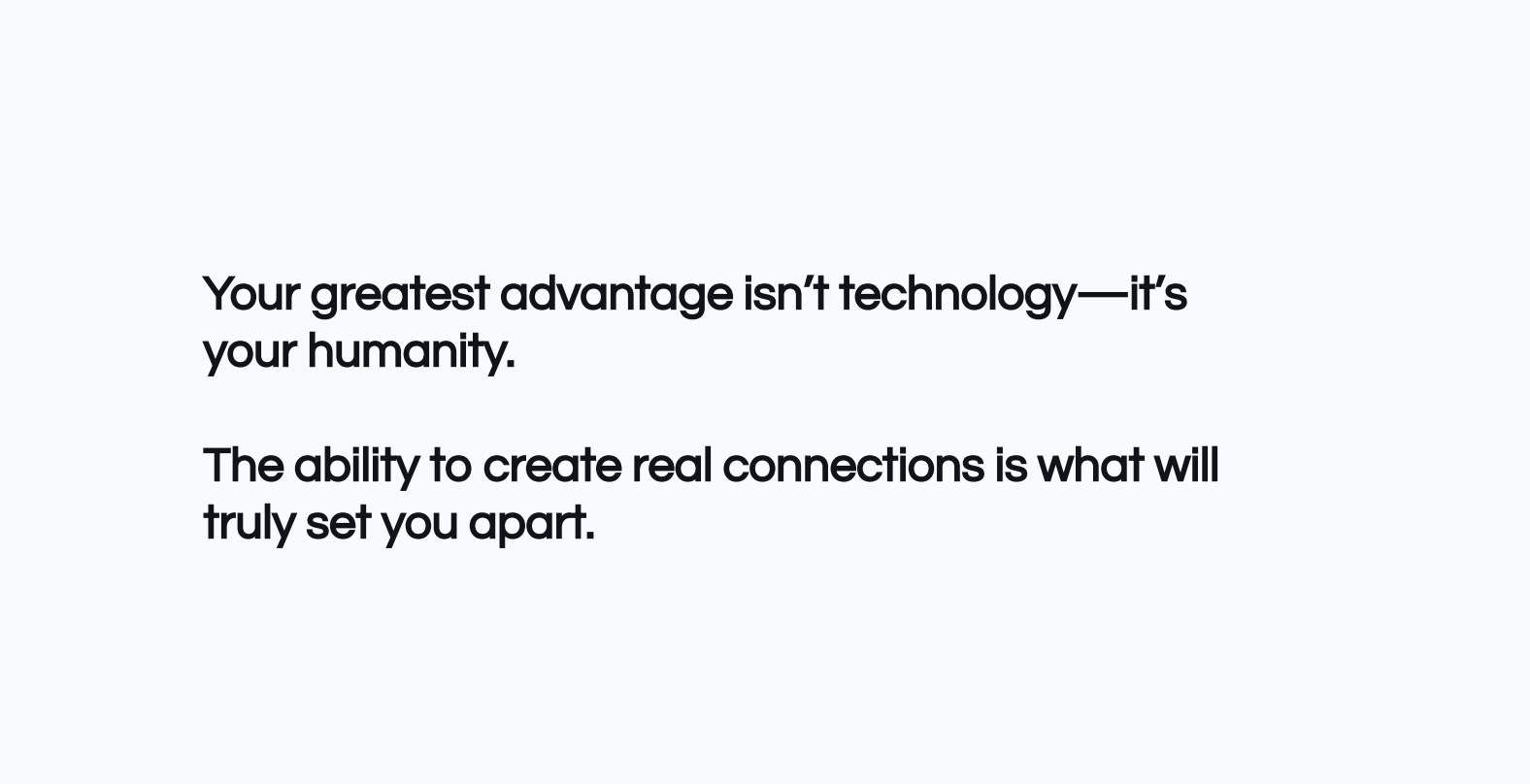
Scaling B2B SEO with Content Collaboration & AI: A Strategy for Sustainable Growth [Yagmur Simsek, SEO Consultant & Founder of Search ‘n’ Stuff Networking Project]
Next up, Yagmur Simsek took to the (virtual) stage to share her clever strategy for scaling B2B SEO.
Using a real-world case study from a niche business in the cybersecurity space, she showed how her approach led to a 150% boost in traffic, keyword rankings skyrocketing from 1,100 to 9,000, and domain authority doubling in just 12 months.
She outlined her structured approach to integrating AI into workflows, trialling it with different types of long-form content and getting researchers & developers, industry experts, and editors to provide that golden human touch.
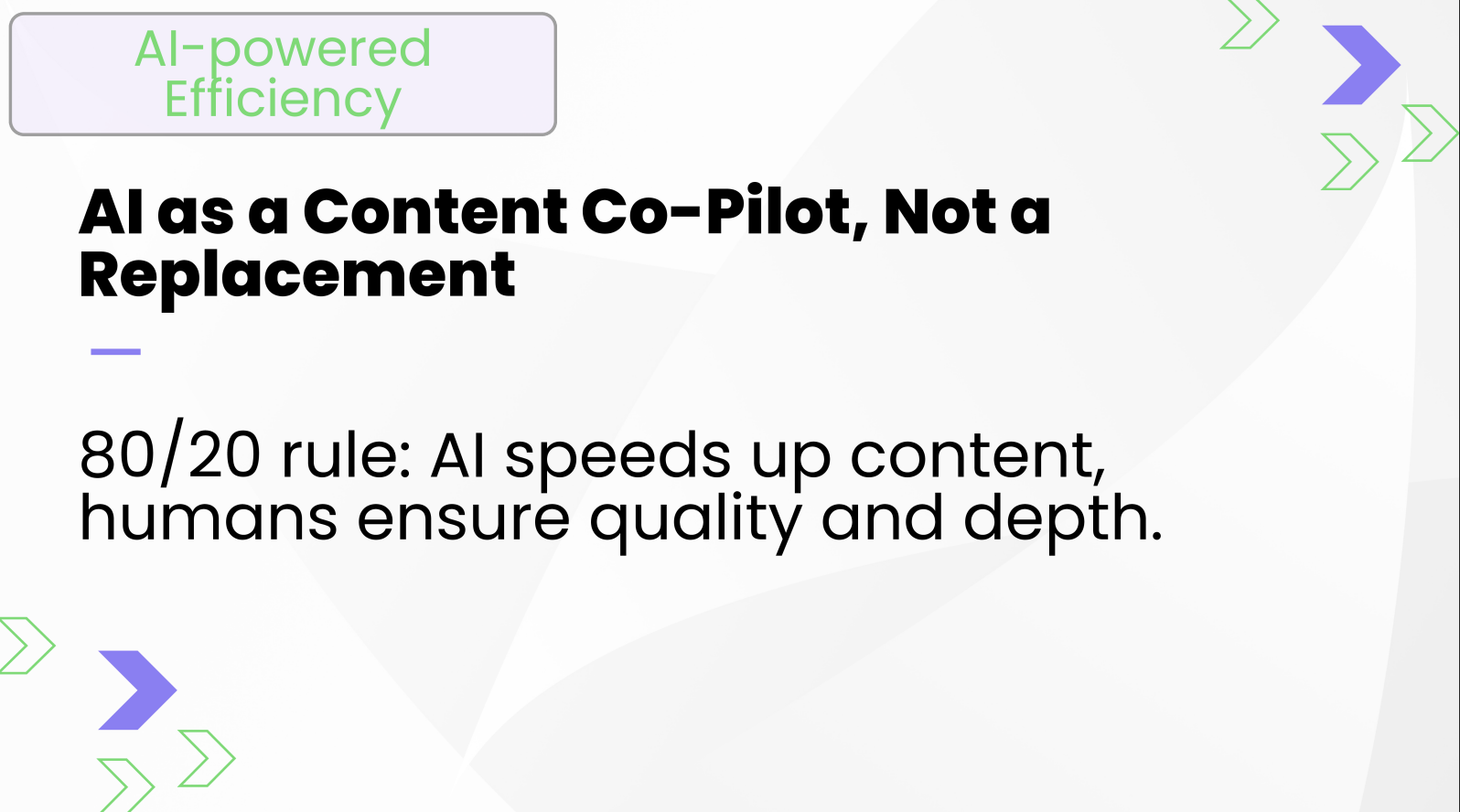
The upshot? AI is a co-pilot, not a captain. Let AI handle the heavy lifting, but keep humans in the driver’s seat for quality, depth, and credibility. Google trusts people, so don’t let the human touch get lost.
Pssst. This links back to how E-E-A-T exists at three levels: author, content, and brand. Read more on our blog.
Content alone won’t cut it, though. Yagmur wrapped up by reminding us that off-page SEO is the cherry on top of a great strategy. She stressed how SEO has to be backed up with real-life visibility, taking your business beyond the SERPs to social media, newsletters, and events.
For us, the biggest takeaways from Yagmur’s session were:
- Use AI to enhance, not replace, human expertise → AI can speed up content production, but humans refine quality, credibility, and depth.
- Create prompt libraries to train LLMs → Create a prompt library to train AI to produce consistent content aligned with your tone and branding.
- Google values expertise, not just content → Expert-led contributions, guest posts, and SME (subject matter expert) involvement add credibility and authority.
- Test and iterate with AI → Different content types require different levels of AI-human collaboration. Listing posts and trend analysis work well with AI, while in-depth insights need expert input.
- Try out different AI tools → There’s more to AI than ChatGPT – don’t sleep on tools like Semrush, Ahrefs, Perplexity, Claude, Contentgo AI, Canva AI and Grammarly.
- Use AI to train AI → Pretty meta, right? Ask an LLM how to improve your prompts for desired results, then use what it tells you to write prompts that get you better outputs.
Content Beyond Keywords: How to Win With SEO Content by Understanding Your Audience [Ellie Wraith, Content Lead at Digitaloft]
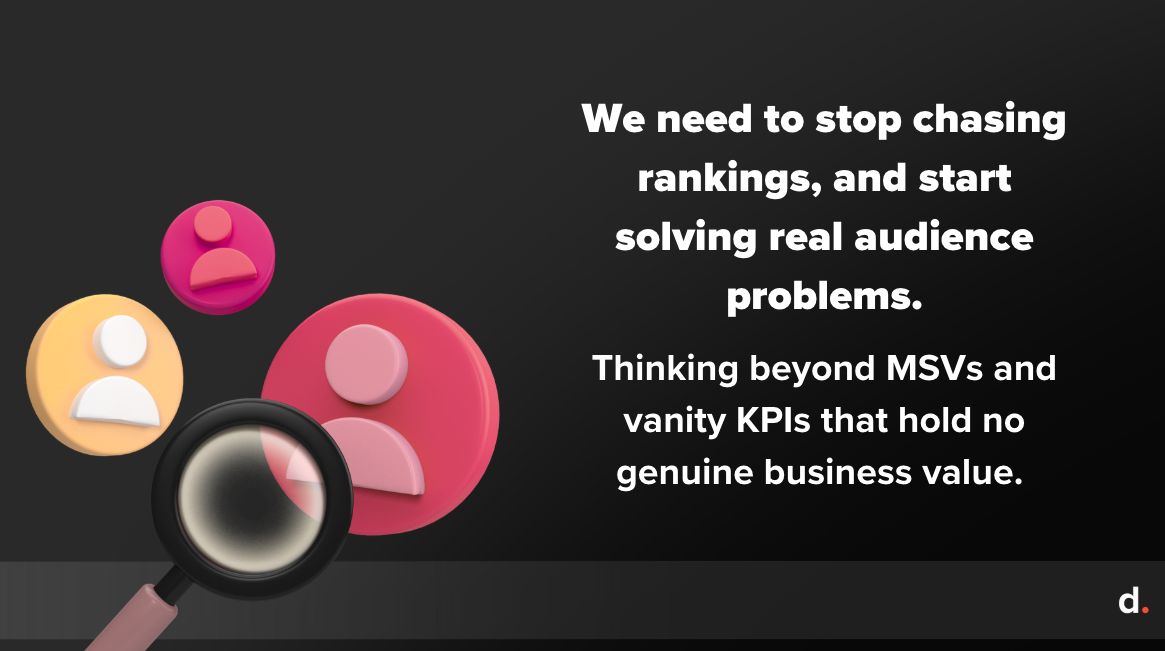
SEO is about rankings, right? Wrong.
Too many businesses still believe ranking #1 on Google is the ultimate goal, but Ellie Wraith’s session made it crystal clear that rankings alone don’t drive success.
SEO content optimised just for keywords and search volume often attracts the wrong audience, fails to engage, and, ultimately, doesn’t deliver business results.
So, what’s the solution? Ellie shared a framework for audience-first SEO content, showing how brands can shift away from vanity metrics and create content that engages, persuades, and converts.
Here are some key takeaways from her session:
- Traditional SEO metrics should validate, not dictate your content → Instead of starting with search volume, begin with real audience insights – sales calls, customer queries, forum discussions, etc. – and use SEO data to refine your approach.
- User intent matters more than keyword volume → A page that ranks well but fails to meet searcher expectations won’t convert. Businesses must map content to real buyer needs, not just optimise for high-traffic terms.
- Content quality alone isn’t enough → Well-crafted SEO content must do three things:
- Speak to real audience problems: Address pain points and objections.
- Go beyond surface-level information: Provide depth, expertise, and unique insights.
- Guide users towards action: Every page should serve a purpose and lead users toward the next step.
- Measure success beyond rankings → Businesses should track engagement, conversions, and revenue impact, not just clicks and impressions.
How to start implementing this today:
- Leverage internal data (customer feedback, sales conversations) to inform content topics.
- Use forums & online communities to uncover emerging customer concerns before they appear in search trends.
- Match content formats to audience preferences – text, video, infographics, or interactive tools.
- Align SEO with sales, PPC, and email marketing to drive bottom-line business impact, not just traffic.
In short, this means we have to accept that SEO isn’t just about getting people to your site – it’s about ensuring the right people land there and take meaningful action when they do.
Ellie’s take-home message didn’t mess about: Stop chasing rankings. Start creating content that actually converts.
How Editing 1m+ Words and Writing 100+ Articles Per Month Really Happens [John Doherty, Founder of EditorNinja]
Last but definitely not least, EditorNinja founder John Doherty took the mic to break down how to scale content production without sinking your profits.
His talk was a blueprint for high-volume success, covering everything from building a dedicated team of talented freelancers to creating pricing strategies that work, streamlining operations, and effortlessly managing demand fluctuations.
He revealed where to find top-tier freelancers, how to hire the crème de la crème, and what it takes to keep them loyal. He even revealed how to turn your team into a referral machine to attract more talent.
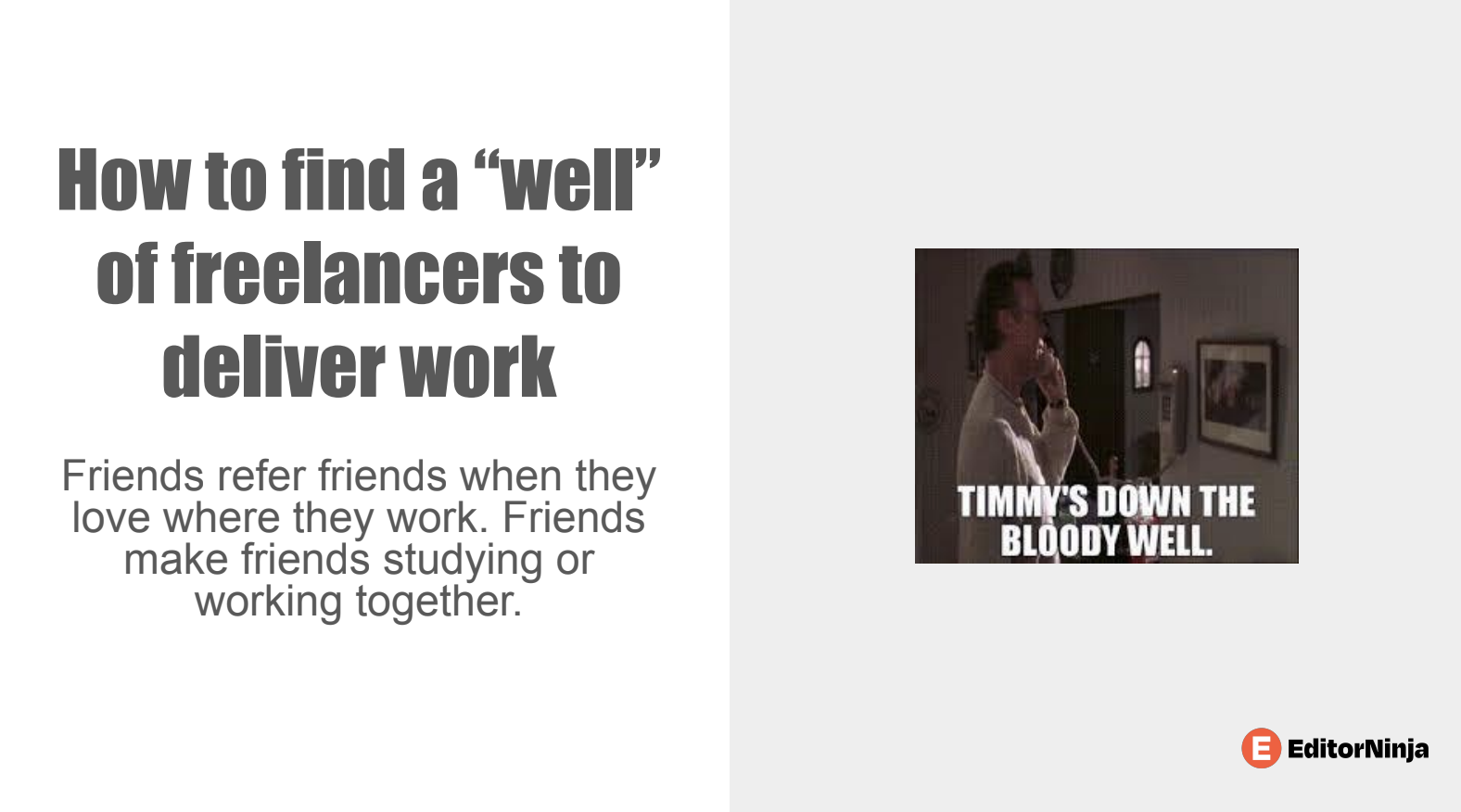
Then, turning to price, John spilt the beans on staying profitable while scaling. His strategy included hacks like capping delivery costs under 40% of revenue and clever mind games to drive more profitable conversions.
John wrapped up with bonus tips for balancing the sales pipeline with talent supply, streamlining operations, and knowing when to cut supply, raise prices, and get hiring for smooth sailing.
John Doherty’s talk was a goldmine of actionable takeaways and a masterclass in working smarter, not harder. His main messages were:
- Productise your service for efficiency → Standardized workflows mean you can confidently sell, deliver, and scale.
- No rush jobs → Set turnaround expectations upfront and always allow extra time for review.
- Dip into a well of freelancers → Use university programs, Facebook groups, and LinkedIn to find great people and vet them through a paid test to gauge their raw talent.
- Retention is key → Treat freelancers like core team members by including them in your core team and offering a small retention payment.
- Price to support growth → Keep delivery costs at 40% of revenue so your business has money to grow, not just survive.
- Balance the sale and hiring pipeline → Start lining up talent when you’re at 75% capacity and hire at 85% to stay ahead of supply without running dry on demand.
- Streamline operations → Centralise knowledge, look for ways to decrease effort and increase output, and hire an operations team as early as possible.
Overarching Themes & Takeaways from the On-Page SEO & Content Summit
Across every session at the On-Page & Content Summit, a few key themes kept coming up – fundamental shifts in SEO strategy, the growing role of AI, and the importance of thinking beyond rankings to create content that actually drives business results.
Here’s what stood out across all the talks:
1. SEO is evolving (again), are you?
Traditional ranking signals and tactics aren’t enough anymore. Topical authority, content credibility, and search intent alignment have become the cornerstones of SEO success. Speakers like Dani Leitner emphasised the need to own a niche rather than chase keywords, while Ellie Wraith challenged the outdated mindset that rankings alone drive success.
Takeaway: Businesses that specialise, provide real expertise, and align content with true user intent – not just search volume – will win in search.
2. AI can help, but it can’t replace humans
AI-generated content is everywhere, but Andy Chadwick and Yagmur Simsek made it clear: relying on AI alone is a losing strategy. AI can assist with structuring, summarising, and formatting, but it lacks originality, credibility, and the ability to understand customer pain points deeply. The brands that succeed will be those that use AI as a tool while keeping humans in control of quality and expertise.
Takeaway: AI is, by definition, average! It should enhance, not replace, human-driven content. Use it for efficiency, but keep humans in the driver’s seat for depth, trust, and strategy.
3. Engagement & conversions matter more than traffic
Several talks, including Ellie Wraith’s, highlighted how SEO success isn’t about getting the most traffic – it’s about getting the right traffic and making it count.
Businesses that focus on vanity metrics (rankings, traffic spikes) rather than conversion-driven content are missing the point. Content needs to be built for users first – answering real questions, solving problems, and driving meaningful action.
Takeaway: Rankings don’t pay the bills, so stop chasing traffic for the sake of it – prioritise engagement, conversion, and business impact over SERP positions alone.
4. SEO shouldn’t can’t work in isolation
One of the strongest messages throughout the summit was that SEO can’t operate as a standalone strategy. John Doherty stressed the importance of scalable workflows and operations, while Ellie Wraith and Yagmur Simsek reinforced how SEO must align with sales, social, PPC, and brand-building efforts to be effective.
Takeaway: SEO is just one piece of the marketing puzzle – integrate it with paid media, social, and offline strategies for maximum impact.
5. The fundamentals still matter
Despite all the talk of AI, search evolution, and new content strategies, one thing remains true: the fundamentals of great content haven’t changed. The brands that thrive in AI-dominated search landscapes, topical authority shifts, and changing user behaviour will be those that:
- Prioritise quality over quantity (for both content and links)
- Build trust and credibility in their industry
- Optimise for real audience intent, not just algorithms
- Measure success based on business impact, not just rankings
Final takeaway: SEO success in 2025 and beyond isn’t about gaming the system or trying to cut corners. It’s about building content strategies that align with what real people need.
Want to put these insights into action?
Of course you do.
Understanding SEO trends is one thing – turning them into a content strategy that actually drives revenue is another.
Digitaloft is a results-first SEO, content marketing, and digital PR agency that delivers real business impact – not just rankings.
Whether you need to build topical authority, create high-converting content, or earn powerful links, our team of experts is here to help.
Let’s talk. Get in touch and see how we can take your organic growth to the next level.



